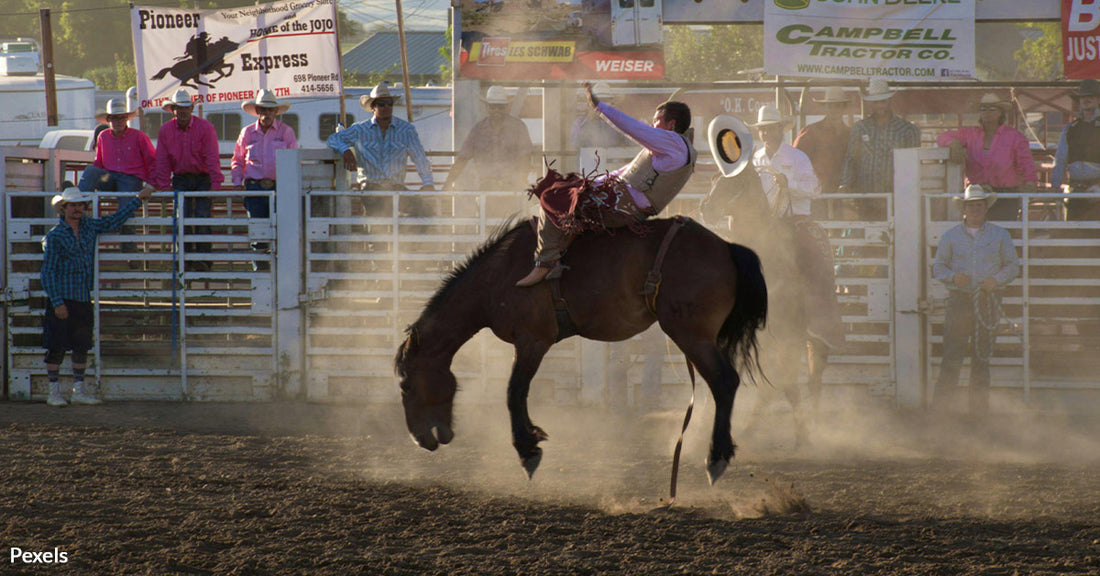Tucson Rodeo Faces Outcry Over Shocking Treatment of Horses
Matthew Russell
The Tucson Rodeo, an event steeped in tradition and spectacle, has recently faced serious allegations of animal abuse, specifically involving the use of electric shock devices on horses.
These claims have sparked a heated debate on the ethics of rodeo practices and the treatment of animals in these events.
 Photo: Pexels
Photo: PexelsThe Tucson Rodeo is accused of using electric shocks on horses.
Rodeo Officials Respond to Abuse Claims
The Tucson Rodeo has been a staple event for nearly a century, claiming to uphold the highest standards of animal care.
Rodeo veterinarian Eddie Taylor, who has served the event for 36 years, told KVOA that the animals are "well taken care of" and that abusing them would counteract the rodeo's goals since "to abuse and not take care of these animals, then you don't have a rodeo."
This sentiment is echoed by the Professional Rodeo Cowboys Association (PRCA), which enforces 60 laws regulating animal welfare at their events.
However, claims from animal rights organizations challenge this perspective. According to Janet Enoch from Showing Animals Respect and Kindness (SHARK), horses were subjected to shocks with devices that could deliver up to 6,000 volts of electricity during the rodeo, Tucson.com reports. Such treatment is alleged to cause severe stress and fear, pushing the animals to perform under distress.
 Photo: Pexels
Photo: PexelsAnimal rights groups claim the shocks are as high as 6,000 volts.
Documentation of Cruel Practices
Undercover videos obtained by SHARK and other advocacy groups, such as In Defense of Animals and Supporting and Promoting Ethics for the Animal Kingdom (SPEAK), depict horses and bulls being shocked as they are released from chutes to encourage aggressive behavior and enhance their performance, reports World Animal News.
These practices have been documented repeatedly over more than a decade, raising concerns about the routine nature of such cruelty.
Gary Vella, a representative from SPEAK, criticizes the rodeo's defense, stating, "That's garbage. We've been hearing that for years. We have a videotape that's been taken over two decades to prove that's not the case at all. It's routine. It's part of the show."
These comments underline the conflict between rodeo officials' assurances and the grim reality presented by activists.
 Photo: Pexels
Photo: PexelsActivists argue that electric shocks cause severe stress and fear in animals.
Public and Legal Responses
The ongoing controversy has prompted calls for legal and regulatory changes. Nearly 16,000 people have signed a letter by In Defense of Animals, urging the Tucson Mayor and City Council to ban the use of electric shock devices.
This move reflects a growing public sentiment that seeks to reconcile rodeo traditions with modern standards of animal welfare.
https://youtu.be/69g6jMUMwcw?si=98zT8I1fqJQORd5J
Despite the rodeo's historical charm and cultural significance, the evidence presented by animal rights groups highlights a darker aspect of the event that may no longer be acceptable to the public.
“Tucson Rodeo inflicts stress, fear, and pain on innocent animals,” said Brittany Michelson, Captive Animals Campaigner for In Defense of Animals. “Shocks and straps force animals to flee and buck in fear, often causing injuries or death. We are calling on Mayor Romero and the Tucson City Council to take a stand against animal cruelty. Thousands of In Defense of Animals supporters want Tucson to ban electric shock devices as a bare minimum to stop the abusive rodeo.”
"This is just putting them in the ring for kicks," said Vella.
 Photo: Pexels
Photo: PexelsSHARK has documented abuse at the Tucson Rodeo through undercover videos.
The debate over the Tucson Rodeo's animal welfare practices presents a crucial juncture for the event's future.
As the community and activists push for change, the ultimate decision will likely resonate beyond Tucson, influencing how rodeos are perceived and regulated nationwide.
Click below and take action for horses in Tucson!

